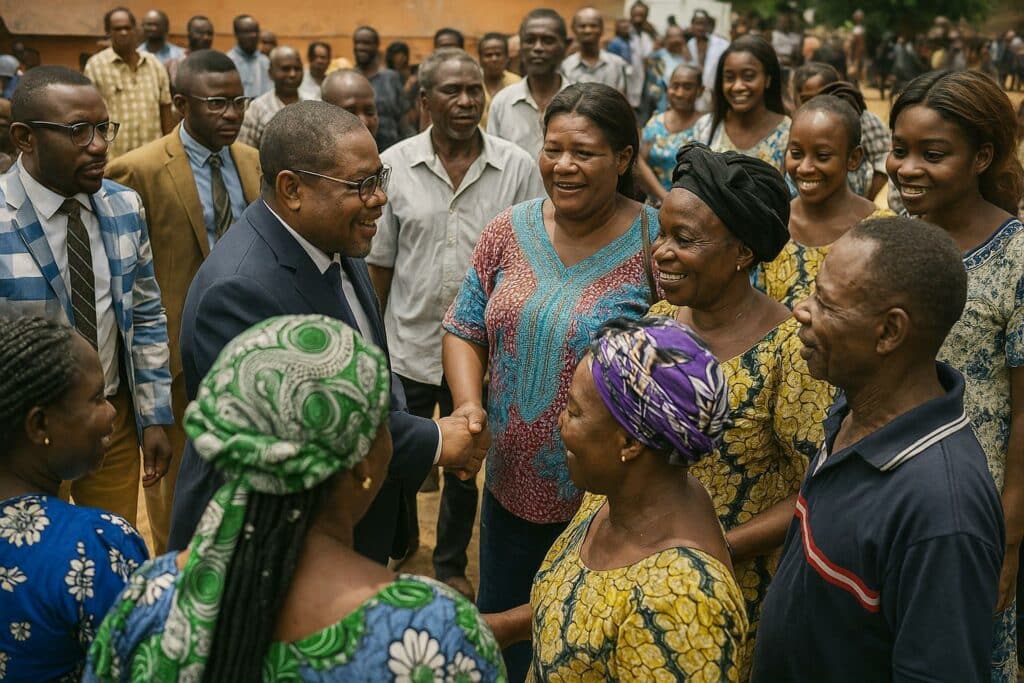Early Registration Momentum Builds in Brazzaville
The late-September humidity did not deter a steady line of residents converging on the fifth constituency office in Ouenzé. There, officials of the national electoral commission have been revising the voter registry since 11 September, following the schedule adopted by the Ministry of the Interior. While the exercise is routine in the life cycle of elections, the atmosphere carried something of a civic renaissance: by mid-morning the flow of citizens had already surpassed the customary two or three daily visitors, according to Yowan Pandzou, a member of the local commission. He credited the surge to the presence of the area’s parliamentary deputy, Urban Sanitation Minister Juste Désiré Mondélé, whose discreet walk-through nevertheless galvanised attention.
Minister Mondélé’s Civic Message
Emerging from the registration booth, Mondélé was succinct yet emphatic. “I have come to exercise my civic right,” he declared, characterising the revision of the lists as a natural pre-electoral act that “takes place everywhere in the Republic.” The minister, who also serves as Secretary-General of Club 2002 – Parti pour l’Unité et la République, praised the Interior Ministry’s logistical arrangements before turning to a broader audience: militants of his party, sympathisers across the political spectrum and, above all, the young Congolese turning eighteen by 2026. Their enrolment, he argued, is not an abstract formality but the condition for “making one’s voice count” in the presidential ballot scheduled for that year.
Ground-Level Logistics of the Electoral Census
Behind the minister’s call lies the meticulous cartography produced after the recent General Census of Population and Housing. That database enables citizens to consult their names at neighbourhood display points, request corrections or initiate first-time registration. Joseph Itoua, secretary-general of Brazzaville’s quartier 43, described a hybrid communication strategy that blends megaphones, block-level chiefs and printed lists taped to walls. He insisted that no deletion occurs without the explicit consent of the family concerned, underscoring the national commitment to procedural safeguards. Observers on site reported that most registrants presented either a national identity card or, like resident Glory Obian, a valid passport to complete the formality within minutes.
Youth Engagement and Party Structures
Mondélé’s remarks also hinted at a strategic reading of voter dynamics. “Politics is not practiced solely in plush salons,” he reminded reporters, suggesting that numerical strength at the polls begins with organisational discipline in the streets. Club 2002 PUR cadres have therefore been tasked with canvassing households, while neighbouring parties replicate similar outreach. The message appears to resonate among first-time voters eager to transition from spectatorship to participation. Several teenagers, notebooks in hand, waited patiently to verify whether their names had already been pre-listed through the population census, a preliminary step before obtaining an electoral card next year.
À retenir
The revision of the voter roll, launched on 11 September, is part of a national calendar designed to guarantee both transparency and universal suffrage in forthcoming elections. Officials report a tangible upswing in public turnout each time elected representatives visit registration centres, suggesting that political leadership remains a decisive catalyst for civic engagement.
Le point juridique
Under Congolese electoral law, only citizens whose names appear on the definitive roll may cast a ballot in the presidential election. The current revision phase permits rectification of clerical errors, inclusion of new adults and objection to improper removals, all under the oversight of the Interior Ministry and the Constitutional Court. The procedure thus not only refreshes the democratic ledger but also provides legal certainty to candidates and voters alike well ahead of the 2026 contest.

